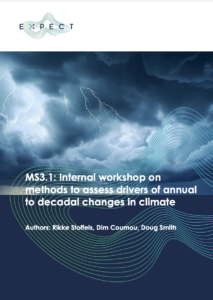Authors: Rikke Stoffels, Dim Coumou, Doug Smith
Abstract
On Monday 9 September (14.00 – 17.15 CET) and Tuesday 10 September (13.00 – 17.00 CET), the EXPECT consortium hosted an online internal workshop on methods to assess drivers of annual to decadal changes in climate. The primary objective of this two-day workshop was for each contributing institution to present their plans for Work Package 3 (WP3; Drivers of annual to decadal changes in climate). This included a detailed overview of the methods to be employed, with the intention of increasing general awareness, receiving feedback and suggestions on the approach, and establishing potential collaboration opportunities. The workshop also provided an opportunity to gather the working hypotheses from each contributing institution.
The online workshop was held just a few months after the start of the project. The rationale for this timing was that it can be valuable to obtain feedback on the methodology at an early stage, to ensure an efficient research set-up and to involve relevant people also from other research themes.
